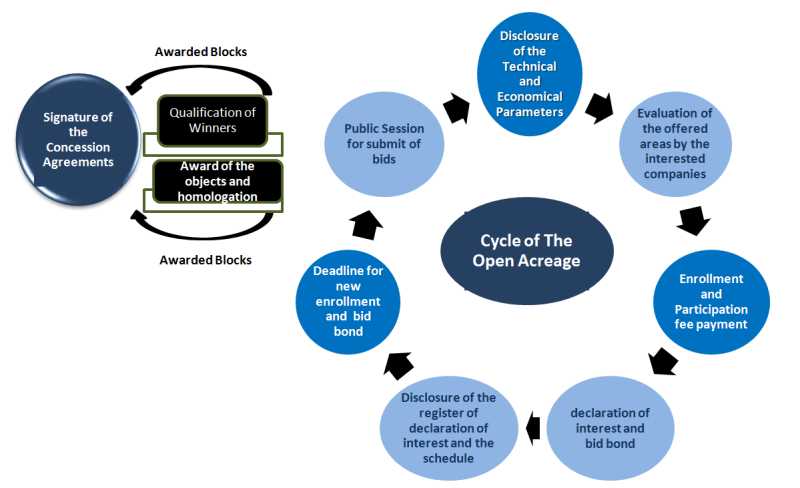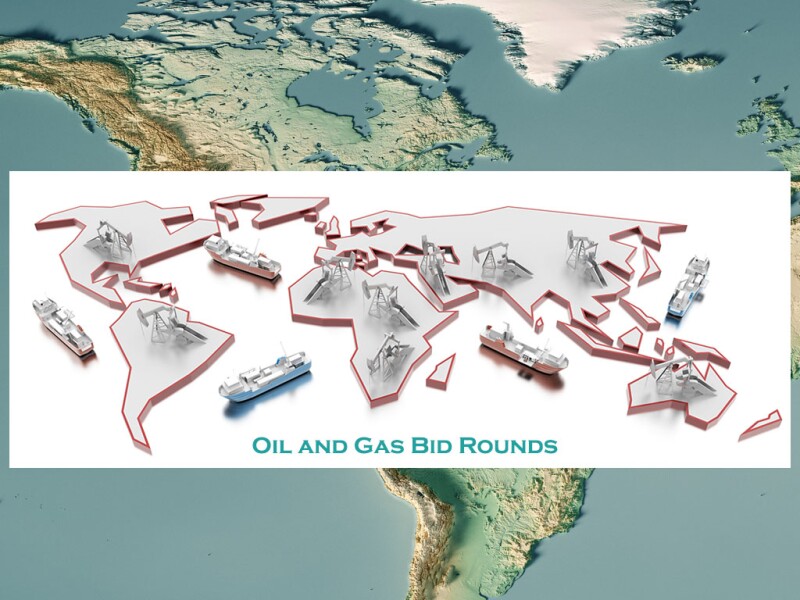Governments and national agencies work diligently to attract investors in order to develop underexplored basins or to resume operations in their more mature plays. On the stakeholders’ end, they review the data available and do their due diligence to determine a development concept that aligns with their strategic objectives. This typically commences through a bidding or licensing round. A licensing round is an invitation by a government to oil and gas companies to bid on the opportunity to explore in that country’s acreage in return for a fee and work obligations. Once there is a discovery, the company may obtain a production license. Since the 1960s, countries worldwide have greatly benefited from bid rounds. For example, in the Eastern Hemisphere, that includes countries such as Norway, the UK, and India, and in the Western Hemisphere, the US, Brazil, and Guyana (Tordo et al. 2010).
Background
Norway, with the well-known Norwegian Continental Shelf, was one of the first countries to hold a numbered licensing round starting in 1965. In this process, the government invites stakeholders such as oil and gas companies to nominate interested blocks or acreage. The nominated acreage is reviewed by appointed government authorities who propose blocks for bid, pending public consultation. Bid rounds worldwide follow the general procedure outlined below.
Bid Round Process
Announcement of the bid round. The first steps of any licensing round would be its announcement. The regulatory body, whether the government or its representative, announces the opening of the licensing round. The announcement includes the number of blocks and other related information such as their sizes and location. The announcement also contains the requirements and deadlines for bid submissions. For instance, India in its December 2021 Bid Round VII announcement included the justification for their choice of blocks, the administrative process of bid submissions as a single company or as a consortium, the financial and technical requirements for operating in the country, and the evaluation process of bids as well as a map of available blocks (Fig. 1). Such information is widely publicized through websites, energy newsletters, and conferences. Some agencies and countries hold road shows or attend energy conferences where they make presentations about the blocks being offered, the criteria for bids, the country’s fiscal regime, and the biddable items.

Participation in the bid round. The announcement is followed by the agency giving access to the available data and information required for stakeholders to complete their evaluations on the available acreage. This includes geophysical data such as seismic surveys acquired over the open areas, well and field data, and model contracts that will govern the exploration and production (E&P) over the acreage such as an E&P license, a production-sharing contract (PSC), and other legislation that may govern operations and ensure industry best practices in the country. This is usually accessed after payment of a bid or participation fee. The Government of the Republic of Trinidad and Tobago, Ministry of Energy and Energy Industries, in their 2021 deepwater competitive bid round, charged a pre-bid fee of $40,000 that allows stakeholders to participate in the bid round and provided all the required geological and geophysical data for the evaluation over all the available acreage, as well as a $50,000 bid fee.
Once the companies receive their technical data package, they may evaluate the prospect of the blocks and propose a work program that outlines the exploration activities for the block(s) over a stipulated period before the closure of the bid round. The Trinidad and Tobago competitive bid round allowed for companies to evaluate and submit their bids for more than 6 months. Interested companies during the launch of a bid round are also required during this time to provide proof of their technical, legal, and financial assurance to operate in the country. This is typically referred to as the pre-qualification process. This surety allows the agency to believe that the company is able to carry out all the technical and financial commitments required by the government.
Closure of the bid round. Upon the closure of the bid round, companies would have submitted the required documents such as the completed bid form, a cash bonus, and bank guarantee as part of their proposal. The agency then has a government-appointed committee open and evaluate the bids as stated in the announcement of the bid process. This method is practiced for transparency. The bids are evaluated based on criteria outlined in documents provided by the government and its agencies. These documents often outline the points allocated to each of the biddable items and the required calculations. There are several items that are biddable such as the exploration work program, local content activities, and cash bonuses. The winning proposals are usually the bids with the highest points and are announced during a specified timeline. The winners are then awarded the blocks and are able to begin exploration activities once contracts are signed. In the event of a tie, a signature cash bonus may be required to determine the winner, or in some instances, the company and the bid evaluation committee are required to enter into negotiations.
The US Uses a Modified Bid Process
In the Western Hemisphere, it is important to note that the US, in granting leases, has slightly modified methods to their bid round process. The Bureau of Ocean Energy Management (BOEM) manages the offshore energy resources and falls under the United States Department of the Interior (DOI). The BOEM uses a two-phased system to access and award bids. The secretary of the DOI is required to prepare an oil and gas leasing program that involves a proposed schedule of lease sales of acreage over a 5-year period. This proposal, referred to as the Proposed Final Program (PFP) undergoes several environmental and financial reviews before approval. The most recent PFP was approved for the years 2017–2022. The BOEM later has a similar transparent evaluation and rewarding process where the BOEM accepts bids over a period of time and these bids are heavily analyzed for environmental effects through public hearings. The bids must meet the BOEM’s fair market value criteria, which means the government receives the value of the right to explore, develop, and produce hydrocarbons in the acreage.

Modifications to Bid Rounds
The dynamic nature of the energy industry, with the volatile prices and the uncertainty of companies willing to take financial risks to complete exploration in underdeveloped and unexplored basins has caused countries to review their fiscal terms, contracts, and biddable items to make their acreage more attractive to stakeholders. For instance, in 1998, Egypt modified its contracts to include a stabilization clause that allows the possibility of the government reinstating the initial economic conditions after a negative event which leads to regulatory changes. These conditions are pending negotiations between the operator and the government companies. India’s Open Acreage Licensing Policy Bid Round-VII blocks were offered under the new Hydrocarbon Exploration Licensing Policy, which allowed for reduced royalty rates and no revenue sharing in blocks within particular categories.
Secondly, in line with the energy transition and net-zero mandates to reduce oil and gas production, countries have made modifications to the operating requirements of companies. For example, the North Sea Transition Authority in September 2020 announced that the UK government had introduced a climate compatibility checkpoint that aligns with its cleaner energy objective of net-zero emissions by 2050 for future licensing rounds. The checkpoint considers projections in production forecasting and cleaner technologies.
There have been two additional methods used to increase interest in bids in times of low prices and lesser success in bidding rounds. These include
- Granting free downloadable data over biddable acreage. The UK in 2018, as part of their 31st Offshore License Round, released government funds to provide free seismic data to its under-explored acreage in their Continental Shelf. This allowed companies, students, and consultants to review the geophysical and field data of the blocks and determine their prospectivity. The results were favorable: At the close of the bid round, the government awarded 37 license areas to more than 30 companies.
- Year-round leasing of marginal fields and underdeveloped acreage. The Norwegian petroleum agency in 2003 introduced a licensing system known as award in pre-defined areas (APA), covering predefined areas in its continental
Another illustration of methods used to encourage investors to explore and produce underdeveloped basins would be the launch of Brazil’s annual open acreage. Brazil’s National Agency of Oil, Natural Gas, and Biofuel (ANP) implemented this round with all of their marginal hydrocarbon accumulations that were being relinquished under an E&P license. The increased interest in those blocks allowed ANP in January 2022 to expand to include all open acreage under the PSCs. The bids, once evaluated by an appointed committee and rewarded, would be reopened with a published schedule of blocks and deadlines.

Conclusion
This article aimed to present the steps taken by the regulators and national agencies to ensure future investments in their oil and gas economy. The article showed that the bid round process is one method that invites stakeholders to explore and develop hydrocarbons in a country’s underexplored or unexplored basins. The success of bid rounds over the decades has ensured that countries gain the value of their resources. Nevertheless, there have been two main challenges with respect to launching a bid round. The downturn cycle of the industry and the mandate of net-zero emissions have caused a few countries to modify their bid rounds processes not only by amending their fiscal terms and contracts but by pushing incentives to develop their marginal fields. This is to ensure that the countries meet their energy demands.
References
Bacci, A. 2021. Egypt’s E&P Investment Safeguards. IHS Market.
BOEM. 2016. Oil and Gas Leasing on the Outer Continental Shelf.
Government of India. 2021. Geoscientific Information of Blocks Under OALP Bid Round-VII, Ministry of Petroleum & Natural Gas, India.
Ministry of Energy and Energy Industries, Trinidad and Tobago. 2021. Deepwater Competitive Bid Round—Bidding Information.
Ministry of Energy and Energy Industries, Trinidad and Tobago. 2021. The Petroleum Regulations (Deepwater Competitive Bidding) Order, 2021.
Ministry of Mines and Energy, Government of Brazil. 2021. Open Acreage Brazil, Oil and Gas Bidding Rounds.
Ministry of Petroleum and Energy, Government of Norway. 2021. Norway’s Oil History in 5 Minutes.
North Sea Transition Authority. 2022. Licensing Round.
Tordo, S., et al., 2010. Petroleum Exploration and Production Rights, World Bank Working Paper 179.


